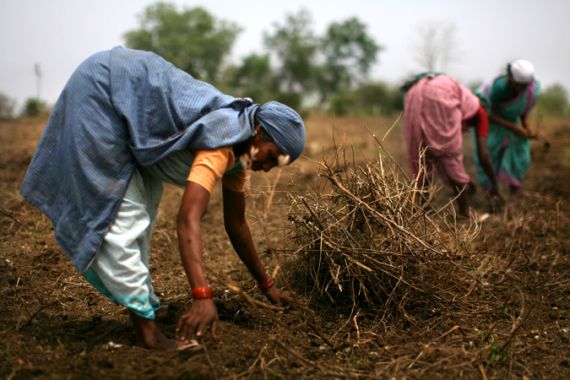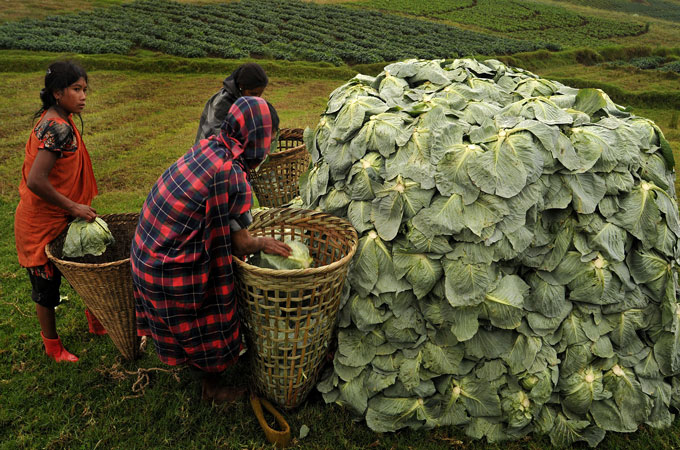The great land grab: India’s war on farmers
Land is a valuable asset that should be used to better humanity through farming and ecology.

 |
| In India, the state forcibly acquires land from farmers and hands it over to private speculators, real estate corporations, mining companies and leisure industries [EPA] |
|
“The Earth upon which the sea, and the rivers and waters, upon which food and the tribes of man have arisen, upon which this breathing, moving life exists, shall afford us precedence in drinking.” |
Land is life. It is the basis of livelihoods for peasants and indigenous people across the Third World and is also becoming the most vital asset in the global economy. As the resource demands of globalisation increase, land has emerged as a key source of conflict. In India, 65 per cent of people are dependent on land. At the same time a global economy, driven by speculative finance and limitless consumerism, wants the land for mining and for industry, for towns, highways, and biofuel plantations. The speculative economy of global finance is hundreds of times larger than the value of real goods and services produced in the world.
Financial capital is hungry for investments and returns on investments. It must commodify everything on the planet – land and water, plants and genes, microbes and mammals. The commodification of land is fuelling the corporate land grab in India, both through the creation of Special Economic Zones and through foreign direct investment in real estate.
Keep reading
list of 4 itemsEvacuation orders issued as wildfire grows near Canada’s Alberta oil patch
Energy summit seeks to curb cooking habits that kill millions every year
Thousands evacuate as wildfire grows ‘dramatically’ in western Canada
Land, for most people in the world, is Terra Madre, Mother Earth, Bhoomi, Dharti Ma. The land is people’s identity; it is the ground of culture and economy. The bond with the land is a bond with Bhoomi, our Earth; 75 per cent of the people in the Third World live on the land and are supported by the land. The Earth is the biggest employer on the planet: 75 per cent of the wealth of the people of the global south is in land.
Colonisation was based on the violent takeover of land. And now, globalisation as recolonisation is leading to a massive land grab in India, in Africa, in Latin America. Land is being grabbed for speculative investment, for speculative urban sprawl, for mines and factories, for highways and expressways. Land is being grabbed from farmers after trapping them in debt and pushing them to suicide.
India’s land issues
In India, the land grab is facilitated by the toxic mixture of the colonial Land Acquisition Act of 1894, the deregulation of investments and commerce through neo-liberal policies – and with it the emergence of the rule of uncontrolled greed and exploitation. It is facilitated by the creation of a police state and the use of colonial sedition laws which define defence of the public interest and national interest as anti-national.
The World Bank has worked for many years to commodify land. The 1991 World Bank structural adjustment programme reversed land reform, deregulated mining, roads and ports. While the laws of independent India to keep land in the hands of the tiller were reversed, the 1894 Land Acquisition Act was untouched.
Thus the state could forcibly acquire the land from the peasants and tribal peoples and hand it over to private speculators, real estate corporations, mining companies and industry.
Across the length and breadth of India, from Bhatta in Uttar Pradesh (UP) to Jagatsinghpur in Orissa to Jaitapur in Maharashtra, the government has declared war on our farmers, our annadatas, in order to grab their fertile farmland.
Their instrument is the colonial Land Acquisition Act – used by foreign rulers against Indian citizens. The government is behaving as the foreign rulers did when the Act was first enforced in 1894, appropriating land through violence for the profit of corporations – JayPee Infratech in Uttar Pradesh for the Yamuna expressway, POSCO in Orissa and AREVA in Jaitapur – grabbing land for private profit and not, by any stretch of the imagination, for any public purpose. This is rampant in the country today.
These land wars have serious consequences for our nation’s democracy, our peace and our ecology, our food security and rural livelihoods. The land wars must stop if India is to survive ecologically and democratically.
While the Orissa government prepares to take the land of people in Jagatsinghpur, people who have been involved in a democratic struggle against land acquisition since 2005, Rahul Gandhi makes it known that he stands against forceful land acquisition in a similar case in Bhatta in Uttar Pradesh. The Minister for the Environment, Mr Jairam Ramesh, admitted that he gave the green signal to pass the POSCO project – reportedly under great pressure. One may ask: “Pressure from whom?” This visible double standard when it comes to the question of land in the country must stop.
Violation of the land
In Bhatta Parsual, Greater Noida (UP), about 6000 acres of land is being acquired by infrastructure company Jaiprakash Associates to build luxury townships and sports facilities – including a Formula 1 racetrack – in the guise of building the Yamuna Expressway. In total, the land of 1225 villages is to be acquired for the 165km Expressway. The farmers have been protesting this unjust land acquisition, and last week, four people died – while many were injured during a clash between protesters and the police on May 7, 2011. If the government continues its land wars in the heart of India’s bread basket, there will be no chance for peace.
In any case, money cannot compensate for the alienation of land. As 80-year-old Parshuram, who lost his land to the Yamuna Expressway, said: “You will never understand how it feels to become landless.”
While land has been taken from farmers at Rs 300 ($6) per square metre by the government – using the Land Acquistion Act – it is sold by developers at Rs 600,000 ($13,450) per square metre – a 200,000 per cent increase in price – and hence profits. This land grab and the profits contribute to poverty, dispossession and conflict.
Similarly, on April 18, in Jaitapur, Maharashtra, police opened fire on peaceful protesters demonstrating against the Nuclear Power Park proposed for a village adjacent to the small port town. One person died and at least eight were seriously injured. The Jaitapur nuclear plant will be the biggest in the world and is being built by French company AREVA. After the Fukushima disaster, the protest has intensified – as has the government’s stubbornness.
Today, a similar situation is brewing in Jagatsinghpur, Orissa, where 20 battalions have been deployed to assist in the anti-constitutional land acquisition to protect the stake of India’s largest foreign direct investment – the POSCO Steel project. The government has set the target of destroying 40 betel farms a day to facilitate the land grab. The betel brings the farmers an annual earning of Rs 400,000 ($9,000) an acre. The Anti-POSCO movement, in its five years of peaceful protest, has faced state violence numerous time and is now gearing up for another – perhaps final – non-violent and democratic resistance against a state using violence to facilitate its undemocratic land grab for corporate profits, overlooking due process and the constitutional rights of the people.
The largest democracy of the world is destroying its democratic fabric through its land wars. While the constitution recognises the rights of the people and the panchayats [village councils] to democratically decide the issues of land and development, the government is disregarding these democratic decisions – as is evident from the POSCO project where three panchayats have refused to give up their land.
The use of violence and destruction of livelihoods that the current trend is reflecting is not only dangerous for the future of Indian democracy, but for the survival of the Indian nation state itself. Considering that today India may claim to be a growing or booming economy – but yet is unable feed more than 40 per cent of its children is a matter of national shame.
Land is not about building concrete jungles as proof of growth and development; it is the progenitor of food and water, a basic for human survival. It is thus clear: what India needs today is not a land grab policy through an amended colonial land acquisition act but a land conservation policy, which conserves our vital eco-systems, such as the fertile Gangetic plain and coastal regions, for their ecological functions and contribution to food security.
Handing over fertile land to private corporations, who are becoming the new zamindars [heriditary aristocrats], cannot be defined as having a public purpose. Creating multiple privatised super highways and expressways does not qualify as necessary infrastructure. The real infrastructure India needs is the ecological infrastructure for food security and water security. Burying our fertile food-producing soils under concrete and factories is burying the country’s future.
Dr Vandana Shiva is a physicist, ecofeminist, philosopher, activist, and author of more than 20 books and 500 papers. She is the founder of the Research Foundation for Science, Technology and Ecology, and has campaigned for biodiversity, conservation and farmers’ rights, winning the Right Livelihood Award [Alternative Nobel Prize] in 1993.
The views expressed in this article are the author’s own and do not necessarily represent the editorial policy of Al Jazeera.
